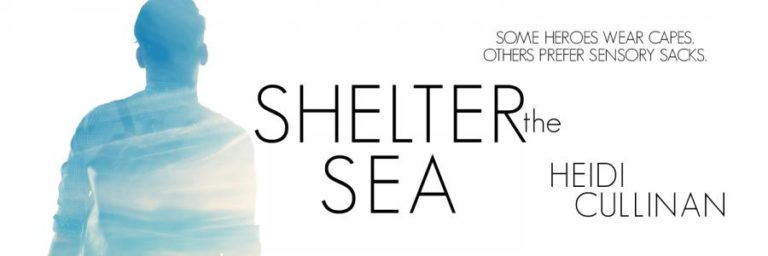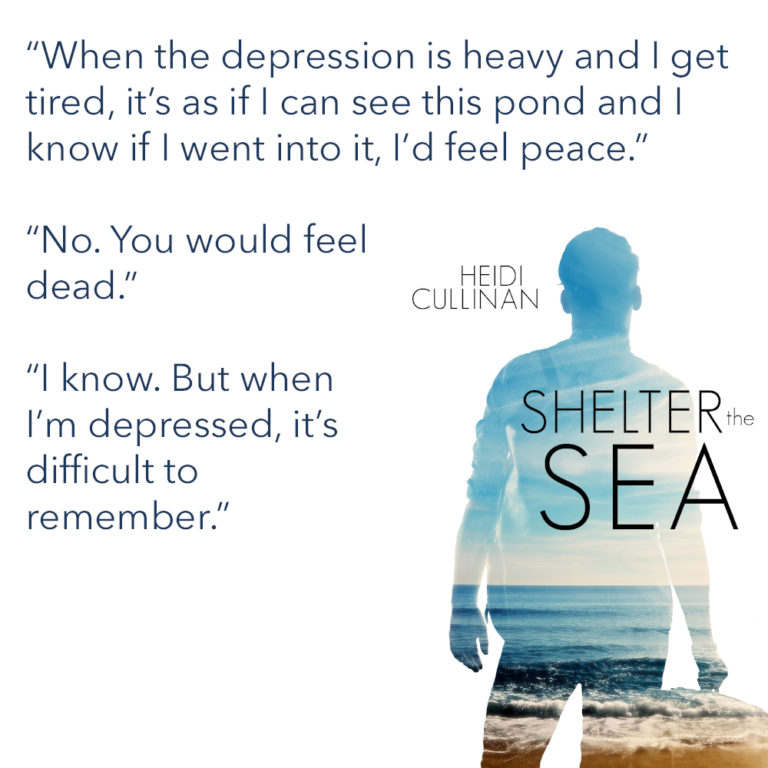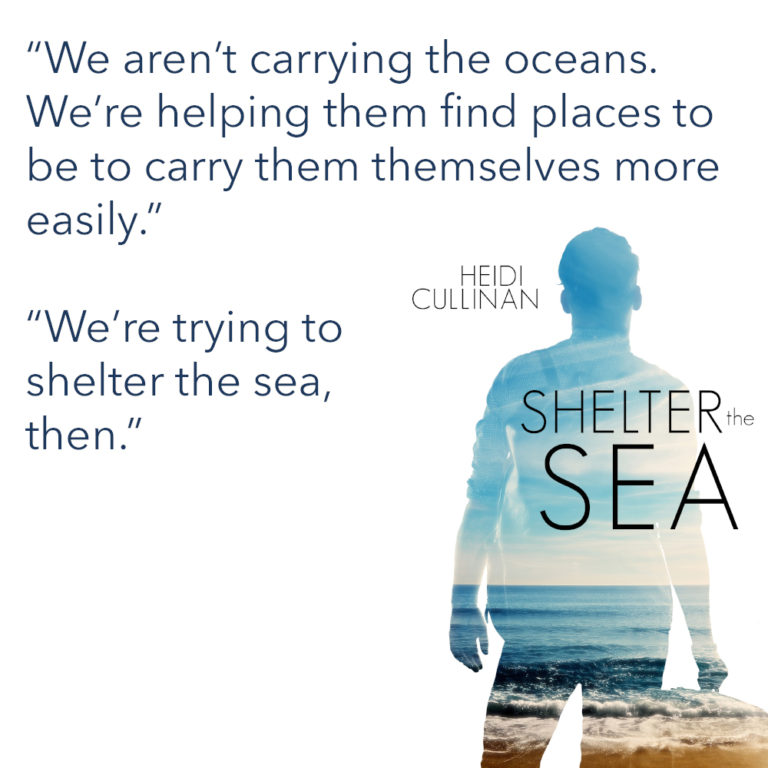A warm welcome today to author Heidi Cullinan joining us to talk about her newest release “Shelter the Sea”.
Heidi kindle answered some questions for us, shares an excerpt and there is a giveaway to participate in!
Welcome Heidi
(questions by Caroline)
Carry The Ocean was the first book I read with both MC’s having challenging disabilities. The book affected me personally as I could see so much of Emmet’s behaviour in my younger brother. Did writing their story affect you differently from other stories you have published?
I take all my characters seriously, but yes, Emmet and Jeremey were personal in different ways. I’ve worked with so many Emmets over the years, and as my daughter, who recently read Carry the Ocean pointed out, I raised someone with more than a few shades of him. I know many, many Jeremeys in my life as well, having married one in particular, but I also used his own Target headphone strategy just the other day to ward off a panic attack during a shopping trip. So yes, everything about this series is different and personal and more resonant.
Where did the idea for Emmet and Jeremy come from and did their story make you more or less nervous than any of your other books?
Emmet popped into my head as a germ of an idea after watching a television show with a high-functioning autistic character, and he kept growing, talking to me, insiting he had a story. I loved him the second he started nudging me, but I couldn’t see the story right away, so I didn’t pick it up at first. But Emmet lingered like no other character. Not pushing, only hovering, and he broke my heart. Finally I said, “Well, who would you be with?” Then there was Jeremey, and what could I do?
Did it make me nervous? All my books make me nervous. The ones that work, anyway. If they’re safe, they’re boring. I’m bored, the reader’s bored, it’s a disaster. This one made me nervous, but I was mostly interested in not misrepresenting a population I cared deeply about, so I did a lot of research and sought out people who could check my work. I knew a great deal about both Emmet and Jeremey and their situations, but that mostly meant I knew where I could accidentally misrepresent them too, so I kept trying to do more and more homework.
What is next for The Roosevelt series? Also, what else can we expect to see from Heidi Cullinan for 2017?
Originally I would have said next in The Roosevelt series is Unleash the Earth, David’s story, and that’s coming. But I don’t know if there’s a third instalment (novella? Short story?) to round off what seems to be the Ocean wave (ha) of The Roosevelt, or if we move on to David first, or what. When I was driving the planning bus we had a mess and delay, so I’m going to let this simmer and have them tell me what to do.
I would say we could talk about it being early next year, but I’m currently backed up trying to recover from the Samhain closing, which involves putting out 13 titles from my backlist, and this is to say nothing of the Wilde City books I had been about to put into circulation and simply hadn’t. This is what 2017 mostly is for me, putting the house back in order, largely self publishing. I have another new title coming out in June, Antisocial, and another instalment of the Love Lessons series coming in the early fall. I plan to do more Minnesota Christmas before the end of the year as well, but mostly I’m working on getting the massive pile of backlist into the pipes again. After that, my plan is to recover. I need to connect with my family, myself, and hopefully take a trip. Still write! I have a lot on my plate. But I want to take a minute to breathe and redirect. I have some plans with both self publishing and a publisher in mind, and a number of foreign deals in place, and audio—there’s so much going on. My goal is to make sure I’m sane and stable in the center of it, and still writing books. Happy, uplifting books.
Available April 18, 2017
The Roosevelt, Book 2
Some heroes wear capes. Some prefer sensory sacks.
Emmet Washington has never let the world define him, even though he, his boyfriend, Jeremey, and his friends aren’t considered “real” adults because of their disabilities. When the State of Iowa restructures its mental health system and puts the independent living facility where they live in jeopardy, Emmet refuses to be forced into substandard, privatized corporate care. With the help of Jeremey and their friends, he starts a local grassroots organization and fights every step of the way.
In addition to navigating his boyfriend’s increased depression and anxiety, Emmet has to make his autistic tics acceptable to politicians and donors, and he wonders if they’re raising awareness or putting their disabilities on display. When their campaign attracts the attention of the opposition’s powerful corporate lobbyist, Emmet relies on his skill with calculations and predictions and trusts he can save the day—for himself, his friends, and everyone with disabilities.
He only hopes there isn’t a variable in his formula he’s failed to foresee.
Amazon US, Barnes & Noble, Kobo, Smashwords
As New Year’s Eve approached, I got the feeling Emmet was up to something, but I couldn’t be sure.
My depression was intense, and as we’ve already established, it lies like crazy. It had plenty to say about my suspicion Emmet had something up his sleeve too, and all its whispers were terrifying, so I worked constantly to shut it down. There was also so much going on with the party preparations and getting ready for our houseguest. Icarus had approved Darren’s overnight with us, and Emmet helped me make my room Darren friendly. Mostly this meant picking things up. Emmet is the reason my room doesn’t dive into becoming a total trash heap, but my idea of tidy is still his idea of pretty screwed up, which is part of the reason I have my own room. Darren said he didn’t mind the mess, but I’d roomed with Darren briefly and knew he appreciated neatness as much as Emmet, so I wanted to take the time to make the space he would borrow appealing to him.
Emmet helped, which I appreciated, as cleaning overwhelmed me, but he could only do so much because he worked. New Year’s Eve was on Saturday night, but I had to do the cleaning during the week, and that’s when Emmet had to be at work. So David helped me as well, as best as David could.
David is both my boss and my best friend. He’s the first person I think to go to when I have a problem, outside of Emmet. Emmet and David are good friends too, though when they first met they didn’t get along at all. We’re the best of friends now. David used to tease me that he wished I could drive and then we could take on the world, but he knows it makes me feel bad, so he’s stopped.
Technically I can drive, as in I have my license, but I get nervous when I do, and I’ve gotten more nervous as I’ve gotten older. I could maybe drive on a quiet street in a small town, but I don’t think I could do Duff Avenue or Lincoln Way in Ames, the main in-town streets that most people from big cities would laugh at me for avoiding. Don’t get me started on store parking lots.
To be honest, managing my own bedroom was struggle enough, but with David’s help, I got it done. He could only do a little here and there with his grabber, but he redirected me and kept me on task, because as he put it, he was good at bossing people around. “Begin with the pile of clothes over there,” he’d tell me, reminding me to sort them into piles of dirty and clean, and when it got to be too much, he suggested I call the whole lot dirty so we could keep moving. This was something Emmet would never have done. We’d have stood there for fifteen minutes having a discussion about each item. This was where David came in handy.
“You’re making some good headway,” he remarked after we’d worked for a half hour. “Why don’t we stop and have a break?”
It seemed early to be taking a break, but I was exhausted. I wondered if it showed, then figured it probably did. Feeling glum, I nodded and followed David as he maneuvered his chair into the kitchen. I sank into a chair at the table before I realized as host and as his staff I should be the one getting our snack, but as I rose, he waved me into my seat.
“Sit. I got this.” He snorted and gave me a wry smile. “Well, maybe I got this. Depends on how high up you put stuff and if I can reach it with my grabber.” When I tried to stand up, he waved at me harder, his arm flapping awkwardly. “Sit down, Jer. It’s a joke.”
I didn’t laugh. “Sorry. I’ve been…” I didn’t know how to finish that sentence. Not without getting in trouble. I’ve been a mess. I’ve been awful.
“You’re having a rough time. Which is why I’m helping you out.” He snagged a box of crackers with his grabber and a stack of plastic glasses. “How’s Emmet doing since you confessed about the depression, by the way?”
“Intense. He wants to fix it.”
“He wants to help you. Not the same thing.”
“He can’t see the difference.” I watched David tuck the stack of glasses under his chin, pull on the stack with his more functional hand, managing to leave two under his chin. It was a neat trick. “Maybe he doesn’t want to fix it exactly. He’s up to something, though. It makes me nervous.”
“No offense, but everything makes you nervous.” He slid the extra cups onto the counter, caught them with his grabber, then aimed the stick at the cupboard. “Okay, I can get them put away, but they’re not going in under Emmet’s standards of neatness. I’ll try to remember to explain to him, but if he gets bothered by this, blame me, you got it? It’s the best I can do with my motor control.”
“I’ll tell him. It’ll still bother him, but he’ll understand.”
“Cool. So what are we having? Water? Soda? Juice? Tea? Whiskey sours?”
The last comment was added to make me smile, and it worked. “There’s green tea in the fridge. I’ll have that please.”
“Dude. If that’s all there is, I’m having water.” He opened the door, then exclaimed in excitement. “Orange soda. Are you for real?”
I’d forgotten about the soda. “It’s for you. Emmet got it the other day.”
“Train Man. You come through for me.”
David wrestled the containers out of the fridge with his better hand and the elbow of his not-so-good hand. This was a trick we’d learned together through trial and error. Apparently a physical therapist or two had also suggested something similar, he admitted later, but David and therapists had rocky relationships on the best of days. He and I, however, got along fine.
It took him about fifteen minutes longer to get us drinks and crackers and cheese than it would have me, but I didn’t mind the time to sit quietly, and David, I knew, appreciated someone letting him do something for himself without trying to help or praising him afterward like he was a toddler. He said this was why I was a good aide, because I was patient. He told me I needed to remember, when the depression told me I was worth nothing, that I was the best aide he’d ever had.
I still didn’t know how to explain to him it was like throwing a compliment into a black hole, so I usually replied, “Okay” and hoped he’d talk about something else.
Today he did talk about something else, thankfully. “Tell me about this Darren,” he said around slurps of orange soda through his special straw, and bites of cracker and cheese. “He’s autistic like Emmet, right?”
I thought about how to phrase my answer. “He’s autistic, yes, but not like Emmet. He’s nonverbal, to start.”
“Like, he doesn’t talk? At all? But I’ve heard him whispering to videos on his iPad.”
“That’s the only time he can talk, and that’s as loud as he gets. Otherwise all he can do is make sound, but it’s more like a bark.” A thought occurred to me. “He’s like Carly Fleishmann.”
David sat up straighter, his whole demeanor becoming both serious and interested. David had a major crush on Carly Fleishmann, a young woman with autism and several other disabilities who had written a book with her father and become something of a minor social media celebrity. “Oh, okay. So does he use a keyboard to talk like she does?”
“Kind of. He uses a special sign language. Emmet knows it, but I haven’t learned much beyond the basics. It’s like ASL, but it’s modified in ways that confuse me. Mostly he uses an iPad to talk for him. He’s smart, but most people don’t think he is. All they see him doing is watching YouTube videos.”
“And you roomed with him at Icarus, right?”
I nodded, crumbling my cracker with my fingers. “Icarus is pretty grim. I wish we could get Darren into The Roosevelt.”
David gestured at the walls. “Well, I told you about the opening. God knows there’ll be more, and there’s still nobody on the waitlist, not anymore.”
“But that’s just it. He can’t afford it.”
David’s cheeks colored, like he was embarrassed. He stared at his lap. “Oh. I…I could talk to my dad, if you want. Maybe…”
He didn’t finish the thought, because he knew he couldn’t get his dad to do anything like what Darren would need. Not with The Roosevelt already in trouble.
I laid the rest out, to make it clear. “Darren can’t afford The Roosevelt, not in any way. He can’t get a job. He’s on disability, but his parents can’t afford what it costs here. I mean, I couldn’t do it without the discount from being your aide and Emmet’s help with food and things. Which I feel bad about sometimes, but there’s nothing I can do about it. It’s expensive to live here.” I realized what my remark sounded like and added, quickly, “Nothing against your dad or anything. I don’t think he charges too much.”
“No. I know what you mean. But that’s the problem, apparently. It costs a lot to run a place like this, it costs a lot to live with disabilities, and nobody wants to pay for it. Nobody can pay for it, except the state, who won’t.” He rolled his eyes. “Too busy saving the money for the normal people.”
Normal people.
I stood up and went to the window, folding my arms over my chest as I stared down at the street, at the sidewalk full of people coming and going. From school, from work. To friends, to family, to the grocery store. To the bus. Laughing, talking. None of them thinking at all about how high the curb was or how busy the crowd or how many strangers might talk to them. Normal people. These were the people who deserved the money from the state, not me. What for, I didn’t know. Tax relief, my dad would say.
They looked pretty relieved to me already.
Emmet would get after me for using the word normal, and I know he’s right, but it’s the word in my head. The people laughing on the street and not caring about anything while I was barely able to leave my apartment, barely able to get to the window to watch them—they were normal, and I was not. Emmet says they’re on the mean, but this always sounds strange to me. What was the term, the usual term? Able-bodied, David said about people who weren’t paralyzed. Technically I was able-bodied, by that standard, but I didn’t feel very able. I’m not able to do a whole hell of a lot. I decided I wasn’t able-bodied, because I was on disability, so no. The word wasn’t for me either.
Able-bodied people didn’t worry about things like I did. Like whether or not they could put themselves together enough to get through their day. Or a grocery store. Or a room cleaning. Able-bodied people didn’t have to make a strategy to get things out of a cupboard. Or have a friend over. Or make sure they had a place to live. They didn’t have to hope their parents kept paying their rent at their fancy residential facility. Or hope every time there was an election Congress didn’t decide to cut their insurance.
Able-bodied people didn’t look at history books and read about the populations sent to the gas chambers and know they would have been at the front of the line to be eliminated as unnecessary. Well, some of them did. Some of them like me had two strikes. Disabled and gay. If I were Jewish or Romany, I’d have three strikes.
I knew I wasn’t wanted. Every day, every aspect of the world, of the culture, made a point to tell me I was different and less than, and so were all my friends. And I was tired of it.
I went back to my chair, tucked my feet onto the seat, and hugged my knees.
David came closer and studied my face like he was trying to read all my secrets. “Talk to me, J.”
I shook my head, turning my face away. “If I talk, I’m going to say something awful.”
David nudged my leg with his wheel. “Hit me with it. I want to hear your awful.”
I swallowed, feeling guilty, but mostly…angry. “Sometimes I hate able-bodied people.”
I’d expected him to laugh, even bitterly, or make another one of his jokes. But all I was met with was long silence, and when he finally spoke, all he said was, “Me too, Jer. Me too.”
Heidi Cullinan has always enjoyed a good love story, provided it has a happy ending. Proud to be from the first Midwestern state with full marriage equality, Heidi is a vocal advocate for LGBT rights. She writes positive-outcome romances for LGBT characters struggling against insurmountable odds because she believes there’s no such thing as too much happy ever after. When Heidi isn’t writing, she enjoys cooking, reading, playing with her cats, and watching television with her family. Find out more about Heidi at heidicullinan.com.

Carry the Ocean + Shelter the Sea signed paperbacks and Roosevelt Blues Brother kit (black fedora and skinny tie)











Since it took me years to obtain degrees in order to work for 36 years with special needs students, I can relate to so much of what is discussed in this blog. I added this book to my TBR book as soon as I first heard about it!
Education also required a bit of dedication for me as well! Thanks for giving us insight into some of the challenges faced and good luck on the release!